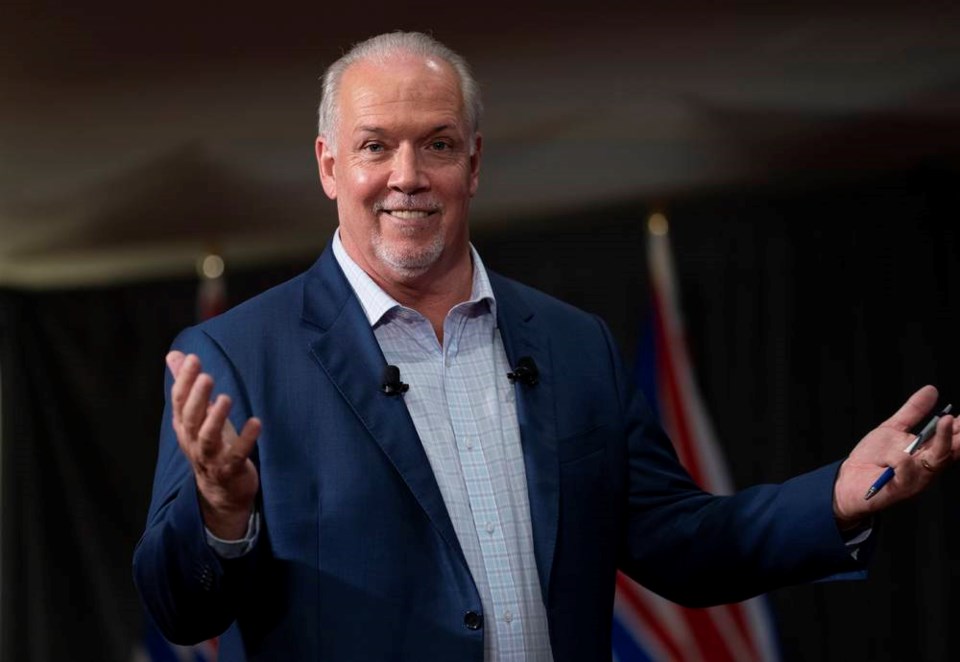You’d think a province that just plunged billions into debt due to a sudden global health emergency would be a little strapped for cash at the moment.
But the parties vying to run B.C. are still promising vast sums of money to individual voters. The campaign is turning into a spending sweepstakes and it still has three weeks left to run.
The NDP matched an earlier B.C. Liberal enticement with one of their own on Tuesday — a $1,000 cheque to every family of moderate means or less, and $500 for individuals. Direct deposit, no less.
And the B.C. Greens threw in $500 a month to stay-at-home parents of small children, just to stay in the game.
New Democrats put the price tag of their giveaway at $1.4 billion.
Liberals suspect it comes from the $5 billion emergency allocation that was unanimously approved in March by all parties, and are outraged at how it was held back to suit the government’s purpose.
They were left flabbergasted at how badly outplayed they were.
They voted then on what they thought was an urgently-needed government response to the economic crisis, only to see part of it saved for use as an NDP election bankroll.
“Unconscionable,” fumed Liberal candidate Jas Johal. “It’s a naked attempt to bribe B.C. taxpayers with their own money.”
NDP Leader John Horgan rejected the idea he was playing politics with the money.
“We did not contemplate this until we were putting together the platform, which was not until after the election was called. We put this together over the past couple of weeks, based on what we see as the needs of British Columbians.”
But the lengthy time between when the recovery plan was first referenced in March and when it was unveiled (four days days before the sudden election call) is continuing to fuel suspicions that this election isn’t as “snap” as it first appeared.
Horgan isn’t the only one promising to give taxpayers money.
The $1,000 cheque is similar to the Liberals’ promise to erase the seven per cent provincial sales tax on most purchases for everyone for a year, and reduce it to three per cent for a subsequent year. That is costed in the $6 billion to $8 billion range.
They also promised on Tuesday an unspecified rebate to voters by way of returning excessive premiums charged in 2020 to the drivers.
“This should have been done months ago, as other provinces have already done, but the NDP wants to bribe you with your own money,” Johal said.
But Liberals are on slippery terrain when it comes to campaigning on Insurance Corp. of B.C. policy.
They played their own games with the corporation over the years and left it deep in debt at the time the NDP took power in 2017.
That prompted the minority government to impose radical changes that will start taking full effect next spring.
Liberal Leader Andrew Wilkinson took another swing at the publicly owned punching bag Tuesday. He promised to end ICBC’s monopoly by opening vehicle insurance to the private market so drivers can shop for the best rates.
The whole premise of his overhaul collapses right there. A monopoly only works if it’s a monopoly. It’s an all-or-nothing proposition and always has been.
As the NDP’s David Eby was quick to point out, private insurers will cream the lower risk customers out of the pool, leaving ICBC to insure the higher-risk ones, with much less room to share the risk around.
It’s a recipe to drive ICBC out of business, which may or may not be the whole point.
And younger drivers would pay even more than the sky-high rates that Eby imposed when he was minister responsible.
The Liberal proposal would also mean two separate systems of determining benefits. Drivers could go to court to fight for more or accept the guaranteed payments under the no-fault variation Eby is imposing. So the big legal fees and court costs that the NDP changes are designed to eliminate will still be a factor in rising rates.
Liberals are also trying to engineer a break for younger higher-risk drivers by giving all new drivers credit for two years of driving experience, doubling that to four if they have taken a driving course.
Reducing rates for two imaginary years of experience?
It’s a measure of how far they have to stretch to come up with new ICBC ideas that disguise the corporation’s recent history.
lleyne@timescolonist.com



